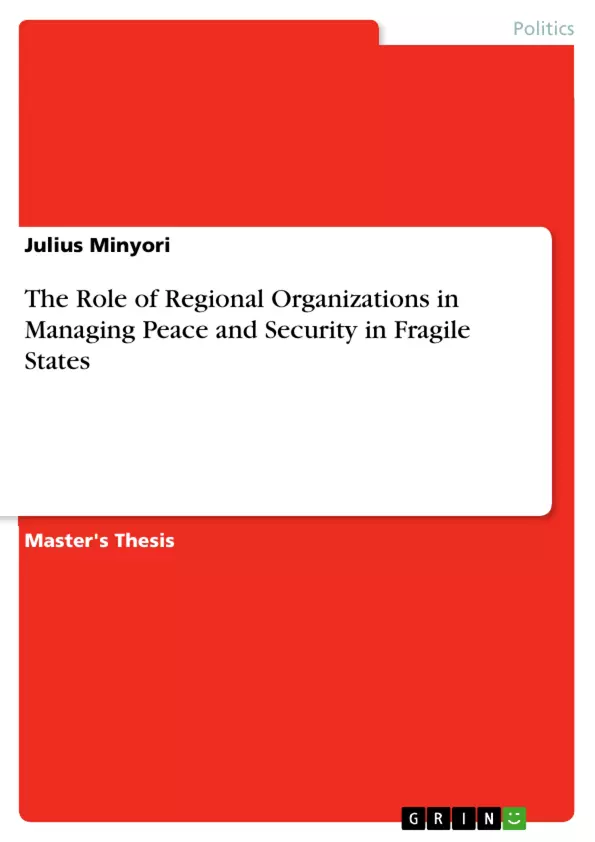The conflict in South Sudan manifested on the 15 December 2013 and the regional organization IGAD moved quickly to manage it by establishing several structures that included the Cessation of Hostilities agreement and the Status of Detainees Agreement. However, the process of negotiating enduring peace and security in the country have proven elusive. Despite concerted efforts by IGAD, AU and even the UN, peace has remained elusive for the people of South Sudan. This research employs the neoliberal institutionalism theory to try and explain the reasons for this failure. It identifies weaknesses that range from conflicting interests of the IGAD member states, to egotistical competitions among the negotiators and lack of understanding of the problem. The attempt to recalibrate the new security problems in the manner of the comprehensive Peace Agreement that brought an end to the Sudan war, can be seen as a failure to appreciate the new conflict dynamics that drive the ethnic war currently ongoing in South Sudan. Moreover IGAD has had a checkered history in peace and security and although it was hoping to use this experience in South Sudan, it failed to evaluate and resolve the South Sudan on its own merit. Thus in conclusion, we find that no conflicts are alike and any attempt to use a template will most likely fail.
Table of Contents
- Chapter 1
- 1.0 Background
- 1.1 Research Aim
- 1.2 Research Question...
- 1.3 Research Objectives.
- 1.4 Research Methodology..
- 1.5 Theoretical Framework
- 1.6 Hypotheses..
- 1.7 Limitations
- 1.8 Ethical Considerations...
- Chapter Two: Literature Review.
- 2.0 Introduction
- 2.1 State Fragility and Peace building in Africa..
- 2.2 Governance and Security in Fragile states
- 2.3 Patrimonialism and security in Africa.
- 2.4 Ethnicity in South Sudan..
- 2.5 Security Threats....
- 2.6 Institutional Conflict Management..
- 2.7 Mediation and Negotiation
- 2.8 Strategic Management.....
- Chapter Three.....
- 3.1 Research Methodology..
- 3.2 Research Design..
- 3.3 Methods of Data Collection...
- 3.4 Sampling Procedure
- 3.5 Data Analysis and Interpretation.
- Chapter Four....
- 4.1 IGADS Involvement in Regional Security..
Objectives and Key Themes
This research paper delves into the role of regional organizations in managing peace and security within fragile states, specifically focusing on the Intergovernmental Authority on Development (IGAD) and its interventions in South Sudan. The study aims to analyze the effectiveness of IGAD's interventions in promoting peace and stability in South Sudan, identifying key challenges and proposing potential solutions.
- The role of regional organizations in managing peace and security in fragile states
- IGAD's interventions in South Sudan
- The effectiveness of IGAD's interventions in promoting peace and stability
- Challenges faced by IGAD in its interventions
- Potential solutions for improving IGAD's effectiveness
Chapter Summaries
Chapter 1 lays the groundwork for the research, outlining the research aim, question, objectives, methodology, theoretical framework, hypotheses, limitations, and ethical considerations. It provides a context for understanding the complexities of peace and security in fragile states and the role of regional organizations in addressing these challenges.
Chapter 2 delves into the relevant literature, exploring concepts related to state fragility, peace building, governance and security in fragile states, patrimonialism and security in Africa, ethnicity in South Sudan, security threats, institutional conflict management, mediation and negotiation, and strategic management. This comprehensive review provides a theoretical basis for understanding the dynamics of conflict and the potential approaches to peace building in the South Sudanese context.
Chapter 3 outlines the research methodology employed in the study, including the research design, methods of data collection, sampling procedure, and data analysis and interpretation. This section clarifies the methods used to gather and analyze evidence, ensuring the rigor and reliability of the research findings.
Chapter 4 examines IGAD's involvement in regional security, exploring the organization's role in peace building and conflict resolution in South Sudan. This chapter analyzes the effectiveness of IGAD's interventions, identifies key challenges, and discusses potential solutions for improving its effectiveness in achieving sustainable peace and security in the region.
Keywords
This research focuses on the key concepts of regional organizations, peace and security, fragile states, conflict management, IGAD, South Sudan, interventions, effectiveness, challenges, and solutions. It explores the role of regional organizations in promoting peace and stability in fragile states, utilizing the case study of IGAD's interventions in South Sudan to provide insights into the complexities of peace building and the challenges faced by regional actors in achieving sustainable peace and security.
- Quote paper
- Julius Minyori (Author), 2018, The Role of Regional Organizations in Managing Peace and Security in Fragile States, Munich, GRIN Verlag, https://www.grin.com/document/446833



